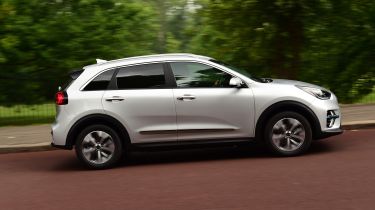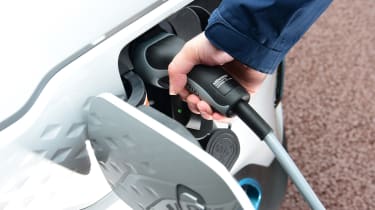Kia e-Niro EV - Range, charging & running costs (2017-2022)
The Kia e-Niro's impressive claimed battery range combines with Kia's excellent seven-year warranty
Based on the latest WLTP fuel economy and range measurement regime, Kia claims a 282-mile battery range for the 64kWh version of the e-Niro. While that's not enough to place the car among the very longest-range EVs that have been launched so far, running top Tesla models very close for a fraction of their prices is a huge achievement.
Kia e-Niro range and charging
A 282-mile range may be considerably less than a petrol-fuelled car can manage on a full tank of fuel, but the truth is that most drivers only occasionally need to travel more than 300 miles between overnight stops. For many, the e-Niro’s range means a single weekly charge will suffice, which doesn’t just further reduce running costs but also greatly increases convenience. Most people will charge overnight, so it’s no more hassle than plugging in your phone before bed.
The e-Niro is also offered with a smaller 39kWh battery and in this form it’s capable of up to 180 miles between charges. While this is less than other electric SUVs such as the Peugeot e-2008, which is capable of around 200 miles on a charge, it could still be a decent (and less expensive) option for those who drive shorter distances.
More reviews
In-depth reviews
When battery range does begin to dwindle, charging is done using a CCS or Type 2 cable fitting into the port hidden behind a flap in the front grille. A Type 2 public charging cable and three-pin plug for charging from a wall socket are standard.
Using a 50kW public fast charger drastically reduces the time it takes to top up the 64kWh battery, taking around an hour and 15 minutes to charge from zero to 80%. Kia says this could be sufficient for more than 242 miles of driving, although this will naturally depend on the way you drive the car. Every e-Niro is also capable of using a 100kW rapid charger, with an 80% charge taking under an hour regardless of battery size. Topping up the battery via a 7.2kWh home or public charger is also easy, with a full recharge of the 64kWh model taking around 10 hours and the smaller 39kWh estimated to take around seven hours.
Irrespective of how you drive, company-car users will always enjoy the low rate of Benefit-in-Kind (BiK) tax that electric cars attract – zero-emissions vehicles benefit from a 2% BiK banding for the 2022/23 tax year, the lowest possible tax group.










